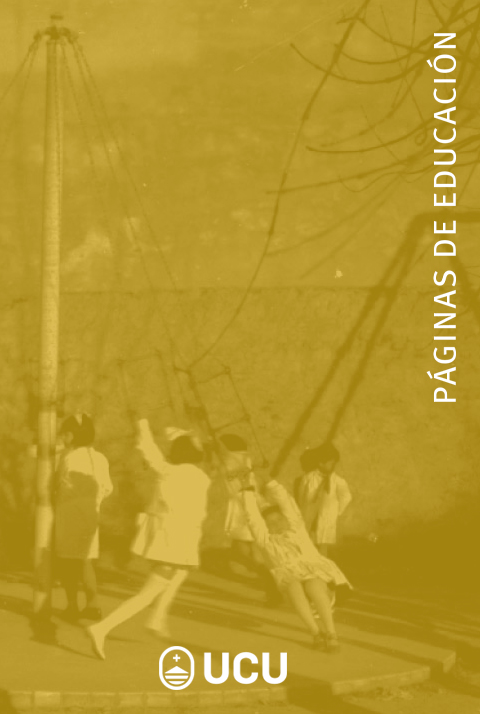Project-Based Learning: A Binding Teacher Training
DOI:
https://doi.org/10.22235/pe.v14i1.2293Keywords:
teacher training, project-based learning, curricular transversality, cooperative learningAbstract
This paper describes an experience that includes the design, procedures and results of a teacher training course on project-based learning (PBL), offered by an official training center in the province of Buenos Aires, Argentina. The course was aimed at teachers from different levels and areas of performance, who formed heterogeneous learning groups to promote work with curricular transversality. This article develops an example of a model project used in the course and analyzes the teachers' productions elaborated to accredit the course and the results of the application of a survey. The purpose of recording the experience was to document information of interest, particularly for future training and educational research. The results show a great acceptance of PBL, but difficulties are identified in its implementation, particularly due to the institutional working conditions.
Downloads
References
Ayerbe López, J. y Perales Palacios, F. J. (2020). «Reinventa tu ciudad»: aprendizaje basado en proyectos para la mejora de la conciencia ambiental en estudiantes de Secundaria. Enseñanza de las Ciencias, 38(2), 181-203.204. https://doi.org/10.5565/rev/ensciencias.2812
Bell, S. (2010). Project-Based Learning for the 21st Century: Skills for the Future. The Clearing House, 83(2), 39-43.
Cascales, A., Carrillo, M. E. y Redondo, A. M. (2017). ABP y Tecnología en Educación Infantil. Píxel-Bit. Revista de Medios y Educación, 50, 201-210.
Coll, C., Mauri, T. y Onrubia, J. (2006). Análisis y resolución de casos problema mediante el aprendizaje colaborativo. Revista de Universidad y Sociedad de Conocimiento, 2(2), 29-41.
Cyrulies, E., Sartarelli, A., Echarri, R. y Vera, S. (2012). Construcción de termotanques solares de bajo costo: un proyecto de voluntariado universitario. Avances en Energías Renovables y Medio Ambiente, 6, 08.131-08.141.
Davini, M. C. (2008). Métodos de enseñanza: didáctica general para maestros y profesores. Buenos Aires, Argentina: Santillana.
Domènech-Casal, J. (2016). Apuntes topográficos para el viaje hacia el #ABP. Cuadernos de Pedagogía, 742, 59-62.
Domènech-Casal, J., Lope, S. y Mora, L. (2019). Qué proyectos STEM diseña y qué dificultades expresa el profesorado de secundaria sobre Aprendizaje Basado en Proyectos. Revista Eureka sobre Enseñanza y Divulgación de las Ciencias 16(2), 2203. https://doi.org/10.25267/Rev_Eureka_ensen_divulg_cienc.2019.v16.i2.2203
Ertmer, P. A. y Simons, K. D. (2005). Scaffolding teachers' efforts to implement problem-based learning. International Journal of Learning, 12(4), 319-328.
Gairín Sallan, J. (2011). Formación de profesores basada en competencias. Bordón. Revista de pedagogía, 63(1), 93-108.
Gutiérrez-Pérez, J. y Pirrami, F. (2011). Water as Focus of Problem-Based Learning: An Integrated Curricular Program for Environmental Education in Secondary School. US-China Education Review, A 2, 270-280.
Johari, A. y Bradshaw, A. C. (2008). Project-based learning in an intership program: A qualitative study of related roles and their motivational attributes. Educational Technology Research and Development, 56, 329-359.
Johnson, D. W. y Johnson, R. T. (1995). Teaching students to be peacemakers: Results of five years of research. Peace and Conflict: Journal of Peace Psychology, 1(4), 417-438.
Larmer, J. y Mergendoller, J. R. (2010). Seven essentials for Project-Based Learning. Educational Leadership, 68(1), 34-37.
Larmer, J., Mergendoller, J. y Boss, S. (2015). Setting the Standard for Project Based Learning: A Proven Approach to Rigorous Classroom Instruction. Alexandria, VA: ASCD.
Perkins, D. (2010). El aprendizaje pleno. Principios de la enseñanza que transforman la educación. Buenos Aires, Argentina: Paidós.
Perrenoud, P. (2004). Diez nuevas competencias para enseñar (1° edic. en español). Madrid, España: Graó.
Roditi, E. (2004). La Résolution de Problèmes Professionnels, Une Modalitè de Formation Continue des Enseignants. París, Francia: Université Paris VII.
Rodríguez-Arteche, I. y Martínez-Aznar, M. M. (2016). Introducing inquiry-based methodologies during initial secondary education teacher training using an open-ended problem about chemical change. Journal of Chemical Education, 93(9), 1528-1535.
Sánchez, J. (2013). Qué dicen los estudios sobre el aprendizaje basado en proyectos. Actualidad Pedagógica. Recuperado de https://www.estuaria.es/wp-content/uploads/2016/04/estudios_aprendizaje_basado_en_proyectos1.pdf
Sanmartí, N. (2016). Trabajo por proyectos: ¿Filosofía o metodología? Cuadernos de Pedagogía, 472, 44-46.
Tejada Fernández, J. (2009). Competencias docentes. Profesorado. Revista de Currrículum y formación del profesorado, 13(2), 222-234.
Vilches, A. y Gil, D. (2011). El trabajo cooperativo en las clases de ciencias: Una estrategia imprescindible pero aún infrautilizada. Alambique. Didáctica de las Ciencias Experimentales, 69, 73-79.
Downloads
Published
How to Cite
Issue
Section
License
Copyright (c) 2021 Páginas de Educación

This work is licensed under a Creative Commons Attribution 4.0 International License.















